Papers by Lucas Henrique Muniz da Conceição
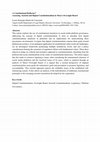
Global Constitutionalism: Human Rights, Democracy and the Rule of Law, 2024
This article explores the use of constitutional narratives in social media platform governance, a... more This article explores the use of constitutional narratives in social media platform governance, addressing the concept of digital constitutionalism. It aims to elucidate how digital constitutionalism manifests in platforms and its implications for democratising these governance environments. It argues that digital constitutionalism exposes three goals toward platform governance: (i) an analogous application of constitutional values in private landscapes, (ii) an ideological framework permeating multiple normativity levels, and (iii) a policy consideration framing the symmetry of regulatory efforts with fundamental values. These three objectives hinge on a liberal and normative approach to constitutionalism, detaching from the political and social considerations at the centre of constitutional democracy. The article argues that this leads to extensive legitimacy issues when considering the transnational character of social media platforms and the localised issues of its users, which is explored through an analysis of Meta's Oversight Board. It is argued that a societal perspective of (digital) constitutionalism must guide the institution's goals and procedures to promote legitimacy and accountability. This societal approach exposes the reliability issues of the established selfreferencing system. It also allows an analysis of the hybridisation of traditional constitutional principles in the emerging societal constitution developed by the corporation.
Judicial Review and Electoral Law in a Global Perspective (1st edn, Bloomsbury Publishing) , 2024
This chapter summarises the historical foundations of the Brazilian framework for electoral manag... more This chapter summarises the historical foundations of the Brazilian framework for electoral management bodies. Furthermore, it analyses the intersection between the Superior Electoral Court and the Supreme Federal Court, perceiving how the accumulation of administrative and judicial power in both institutions affects Brazilian constitutional democracy. It argues that the relationship between the two courts has been ambivalent, with moments of confrontation, deference, and interdependence, despite the relative autonomy of both institutions. The chapter concludes with a critical analyses of the role performed by both institutions during the 2022 General Election period, particularly concerning the protection of the democratic regime.
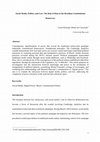
Journal of Iberian and Latin American Research, 2022
Contemporary manifestations of power that exceed the traditional nation-state paradigm undermine ... more Contemporary manifestations of power that exceed the traditional nation-state paradigm undermine constitutional democracies' foundational principles. The Cambridge Analytica scandal demonstrates how non-state actors can exercise control and bypass individual political autonomy by exploring personal data and manipulative practices. In Brazil, similar electoral practices occurred during the 2018's election period. Political propaganda transcended traditional media outlets through social media platforms, such as WhatsApp and Facebook. Here, this is considered one of the consequences of the political reform established in Brazilian legislation, through the enactment of the Legislative Act 13.488/2017. This article proposes an investigation into the intersection between knowledge and power in the mechanism of manipulation of political subjects, considering Michel Foucault's critique of sovereignty, and conflating this understanding with Bernard Harcourt's consideration of "digital power." The aim is to evaluate the intricacies between digital media, politics, and law, addressing the complexity of power structures in the material and cybernetic space.
Insight Inteligência, 2021
O presente artigo propõe uma reflexão sobre o significado do federalismo constitucional a partir ... more O presente artigo propõe uma reflexão sobre o significado do federalismo constitucional a partir da experiência proporcionada pelas megacidades, que emergem enquanto verdadeiros espaços de ressignificação constitucional da importância urbana. É preciso repensar o status ocupado pelas cidades na ordem constitucional, já que são formalmente integrantes do pacto federativo, ainda que usualmente esquecidas nas considerações e arranjos políticos. A partir da discussão proposta por Ran Hirschl,[2] se mostra relevante a densificação dos argumentos basilares para o reposicionamento do governo urbano municipal no desenho constitucional federativo.
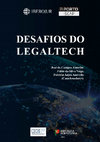
Desafios do LegalTech, 2020
The expansion of the internet and digital media communications in the 21st century was embraced g... more The expansion of the internet and digital media communications in the 21st century was embraced globally as a manifestation of democratic values and individual liberties (freedom of association, expression, and access to information, to name a few). Concurrently, western societies have observed the encroachment of democratic levels and the rise of populism in recent years. To comprehend this apparent dichotomy, this paper will investigate the theory of digital constitutionalism, which argues for the transcendence of the principles of rule of law to the private sphere that regulates relations and social practices in the digital realm – specifically in social media platforms. This approach presents an extension of the liberal perspective of constitutionalism, casting the constitutional project of limitation of power and respect for individual human rights to the digital landscape in a normative structure. However, reducing the constitution only to its normative perspective not only entails the derogation of its political aspect in the maintenance of a democratic society, but also fails to consider other social complexities that influence constitutional moments in western civilizations (e.g. economy, ethics, and religion). This forestalls an analysis of the complexities associated with computerized media, globalization and the exponential privatization of government capacities. Through an analytic-philosophical approach, this paper proposes to establish a multi-disciplinary approach focusing on the perspective of societal constitutionalism, understanding the constitutional principle beyond its liberal and normative perspective and concerning the multiple complexities of the social environment. This allows us to embark on a constitutional quest that rethinks power, politics, law and democracy maintaining the end goal of protecting the political autonomy of individual citizens and the protection of human rights. This implies considering digital constitutionalism from a democratic point of view, addressing the role of platforms as moderating agents of discourses, as well as their performance as an agent that influence the deterioration of democratic levels. The concern, therefore, is twofold, as it refers not only to the governance exercised by social media platforms to the detriment of their users but also to the correlation of virtual communities with the broader legal and political scenario in which they are inserted. The article concludes that a critique of digital constitutionalism must address the new structures of power and governance that establish themselves outside of the paradigm of the nation-state but contribute to the decay of democracy levels in the societies they are based on.
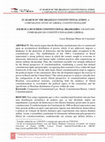
Revista Eletrônica da Academia Brasileira de Direito Constitucional, 2019
This article argues that the Brazilian constitutional ethos is constructed upon an asymmetrical d... more This article argues that the Brazilian constitutional ethos is constructed upon an asymmetrical distribution of powers which, if not addressed, imposes a hindrance to the protection of democracy and the human rights recognised in the constitutional pact. The establishment of the 1988's Constitution in Brazil represented a strong political stance in which the country sought to overcome its democratic deficiencies and human rights violation practices after experiencing an intense military dictatorship. Thus, the constituent assembly was strongly influenced by the liberal perspective of constitutionalism, establishing a system that defined constitutional rights and principles, recognizing their normative force within the legal framework of the state. On the other hand, liberal constitutionalism tends to suppress the political nature of the constitution. How this development impacts the exercise of power in Brazil and the United States? This article proposes to analyse critically how the configuration of the strictly liberal perspective of constitutionalism impacts Brazilian socio-political structure, considering both the tendency of liberal constitutionalism to overshadow the political aspect of the constitution and the specificities of Brazilian distribution of power within the state.
Keywords: Comparative Constitutional Law. Brazil. Constitutional History. Liberal Constitutionalism.

O presente artigo analisa a perspectiva crítica do constitucionalismo político, no Reino Unido, e... more O presente artigo analisa a perspectiva crítica do constitucionalismo político, no Reino Unido, em conluio com a consideração dos precedentes enquanto fonte normativa. Dessa forma, busca-se fomentar a análise crítica do precedente constitucional no paradigma brasileiro, assim como as repercussões institucionais que envolvem não só o poder Judiciário, mas também o Poder Legislativo e Executivo na definição de sentido e interpretação da Constituição. Desta feita, argumenta-se por uma relação construtiva de direitos entre os poderes do Estado que tenha por base os valores democráticos que estão na raiz do sistema constitucional brasileiro.
Abstract:
This article analyzes the critical perspective of political constitutionalism in the United Kingdom and considers the role of precedents as a normative source. It seeks to promote a critical analysis of the constitutional precedent in the Brazilian context, as well as the institutional repercussions that involve not only the Judiciary but also the Legislative and Executive Powers in the definiton and interpretation of the Constitution. This paper argues in favor of a constructive relationship of rights between the branches of State power based on the democratic values that are at the heart of the Brazilian constitutional system.
Opinions in Online Blogs/ Popular Press by Lucas Henrique Muniz da Conceição
The Digital Constitutionalist Blog, 2023
The academic debate on forms to regulate the flow of information on the Internet has, unsurprisi... more The academic debate on forms to regulate the flow of information on the Internet has, unsurprisingly, focused on the US and European paradigms. Although cyberspace’s decentralized, privatized, and globalized nature constitutes a challenge for every constitutional democracy in the world, the attention is centred on these two regions, each one translating its dreams and nightmares into digital policy. While examining these oneiric experiences is mandatory to understand the trends in Western Internet governance, it is urgent to expand the transatlantic discussion. How has Latin America’s context conditioned the conversation on regulating the digital sphere? What should be the Latin American vision for an innovative, fair, and safe information society?

Verfassunblog, 2022
On 6 December, Meta's Oversight Board (OB) issued its policy advisory opinion on ‚cross-check', a... more On 6 December, Meta's Oversight Board (OB) issued its policy advisory opinion on ‚cross-check', a content moderation system used by the company to avoid the erroneous removal of content shared by highly influential users on its platforms. Although previously investigated by the OB under the auspices of the Trump de-platforming case, the issues with the system's performance became prominent only after the document leak known as the Facebook Files, disseminated by whistle-blower Frances Haugen. The opinion showcases important considerations for the authority and independence of the OB as a representation of societal constitutionalism (Maroni, 2019; Gradoni, 2021; Golia, 2021). The OB was established following a liberal constitutional narrative, and the institution's opinions have hinged on broader issues concerning governance, legitimacy and accountability within Meta. Despite the opinion's directness in calling the company out for its disproportionate attention paid to corporate interests to the detriment of its human rights commitments, the OB's decision presents an underlying duplicity, as it criticises policy and design choices replicated in the OB's own architecture. This curtails the institution's capacity to enhance accountability and legitimacy.
Blog of the International Journal of Constitutional Law (I-Connect), 2022
After a tumultuous October, the Brazilian General Elections have come to an end, with President L... more After a tumultuous October, the Brazilian General Elections have come to an end, with President Luiz Inácio Lula da Silva registering approximately 60.34 million votes, representing a tight majority in the electorate (50.9%). Among the political debates concerning the second round of the election was the intensification of disinformation campaigns distributed on social media platforms and the possibility of institutional rupture from Bolsonaro's resistance to accepting his defeat.
The Digital Constitutionalist Blog, 2022
During the first stages of Internet regulation, Brazil, alongside fellow developing countries, po... more During the first stages of Internet regulation, Brazil, alongside fellow developing countries, positioned itself along the lines of a sovereigntist approach toward developing communication services. On the other hand, the United States and the European Union argued for a narrow understanding of what Internet governance should entail-following, at the time, a cyberlibertarian tradition that promoted self-regulation, bottom-up coordination, and the view of governance as encompassing only the Internet's technical infrastructure. Brazil and other members of the G20 (e.g., China, South Africa, and India) argued for a broader definition according to which governance should include, beyond the Internet's technical elements, issues such as illegal content and cybersecurity (Flonk et al. 2020).

Blog of the International Journal of Constitutional Law (I-Connect), 2022
On March 18, Justice Alexandre de Moraes decided to suspend Telegram until the platform complied ... more On March 18, Justice Alexandre de Moraes decided to suspend Telegram until the platform complied with the previous five decisions issued by the Supreme Court. The decision follows the partial results of the current judicial criminal inquiry no. 4781, in which investigations have uncovered an extensive system of financing and dissemination of disinformation, with calls to overthrow the Supreme Court and attack its Justices.
The first verses of Cohen’s song neatly summarize the conflict between the Brazilian constituted powers and Telegram, the messaging platform known for its laissez-faire attitude towards content moderation. If Telegram is the ‘dealer’ of disinformation, hosting a plethora of groups and accounts tasked only to antagonize the Brazilian democratic regime with authoritarian discourse, the Supreme Court and democracy itself will be ‘out of the game.’ Contrastingly, if only Telegram and other social media platforms can curtail the threat to democratic governance, it also means that constitutional democracy itself is ‘broken and lame.’
One can observe the situation’s complexity by understanding that both sides of the debacle made mistakes. On the one hand, the decision is plagued with technical faux pas that undermines its value. On the other, Telegram has refused to comply with the Supreme Court orders for more than seven months, not only impeding the proceedings of an ongoing criminal investigation but also failing to engage with the Court and other governmental agencies to provide information and possible countermeasures to curb the spread of disinformation concerning public affairs.
Media Laws: Law and Policy of the Media in a Comparative Perspective, 2022
On September 30th, 2021, the Brazilian Chamber of Deputies approved the Brazilian Legal Framework... more On September 30th, 2021, the Brazilian Chamber of Deputies approved the Brazilian Legal Framework for Artificial Intelligence (Marco Legal da Inteligência Artificial, Bill no. 21/2020), a 10 article bill that intends to regulate the development and use of AI technology within Brazil. Although the bill can still be modified in the Senate, as it stands, there are some controversial provisions. Chiefly, there is among them the system of protections, safeguards, and guarantees, which seem to fail to implement significant concerns raised by civil society groups and representatives. This essay will introduce some of the proposed regulation issues contextualizing them with Brazil’s past multistakeholder experiences in regulating new technologies.

The Digital Constitutionalist Blog, 2022
On January 6, 2021, the world observed one of the most robust democracies in the world experience... more On January 6, 2021, the world observed one of the most robust democracies in the world experience an attack on one of its central institutions. The U.S. insurrection against the Capitol building represented the outcome of the impact of social media platforms in the rise of radical and anti-democratic political groups. At the end of the same month, similar political and constitutional disturbances could be seen in India. The government used its power to mandate the censorship of multiple posts and accounts on Twitter to silence legitimate protests against its new agricultural policy.
Both situations represent political disturbances influenced, at least in part, by digital technologies and platform governance and could be analyzed through the lenses of digital constitutionalism. There are different perspectives on the extension and application of digital constitutionalism. Suzor highlights the concept as an application of constitutional principles in the digital environment and the extension of the rule of law towards private governance in virtual communities. More broadly, Celeste defines it as the ideology that frames national, regional, and transnational development of regulatory practices towards protecting fundamental rights and balancing powers in the digital environment.
In his systematic theorization, Edoardo Celeste highlights how the concept of digital constitutionalism has developed since the expansion of internet technology beyond its initial academic and military purposes. The author’s systematic definition allows for the conciliation of different perspectives of digital constitutionalism, focusing on the normative reactions to the influence of digital technology in contemporary societies. This piece will attempt to present a different perspective, taking into account the intersection of the societal framework in which platform governance is inserted. This framework considers the normative expectations both from the national and the digital (mainly, private companies) standpoints, situating digital constitutionalism also in its political character.
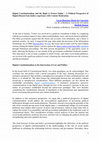
The Blog of I-CON: The International Journal of Constitutional Law, 2021
At the end of January, Twitter was involved in a political conundrum in India, because it complie... more At the end of January, Twitter was involved in a political conundrum in India, because it complied with the government request to ban controversial hashtags, users, and tweets from its platform. The Indian government argued that the tweets and accounts were defamatory and a threat to national security. As such, it requested the gag order under the provision of the Information Technology Act of 2000 (Section 69A). In truth, the tweets and accounts were by and of Indian citizens joining the Indian farmer’s protest against the three controversial farm bills expedited through Parliament proceedings. The bills present deregulation of the agriculture sector in India, allowing business to run outside of the government established wholesale markets. This altercation is one of many examples in which Twitter, and other social media platforms, are involved with significant political events, reframing the relationship between the citizenry and the government.
Blog of the International Journal of Constitutional Law, 2020

Conjur, 2020
1 de maio de 2020, 11h27 Por Lucas Henrique Muniz da Conceição O vírus que contamina o Brasil não... more 1 de maio de 2020, 11h27 Por Lucas Henrique Muniz da Conceição O vírus que contamina o Brasil não é novo e muito menos sem cura. O presidente Jair Bolsonaro não inova quando participa de manifestações a favor da ditadura militar. Enquanto a democracia constitucional brasileira preconiza o Estado de Direito, o poder limitado do governante, a separação de poderes, a autonomia dos estados e os direitos fundamentais dos cidadãos, o que de fato se observa no país é uma fraqueza institucional frente às atitudes antidemocráticas de diversos líderes políticos. Em abril de 2018, Geoffrey Robertson, imponente advogado especializado em Direito Internacional e Direitos Humanos em Londres, palestrava na SOAS (School of Oriental and African Studies) da Universidade de Londres acerca do "caso Lula"-seu aprisionamento e sua busca pela candidatura nas eleições presidenciais brasileiras em 2018. À época, o advogado manejava recurso ao Comitê de Direitos Humanos da ONU e, em sua palestra, argumentava que o Brasil apresentava um déficit quanto à regulação e à aplicação do conceito de rule of law e suas verdadeiras implicações no ambiente político. De forma eloquente, Robertson dizia que o Brasil não compreendia de fato as necessidades de uma democracia constitucional que prezasse pelo Estado de Direito. A época, certos juristas receberam a argumentação de Robinson de forma crítica. Via-se no seu posicionamento uma postura que beirava à arrogância, distanciada de diversos aspectos jurídicos, políticos, culturais e sociais do Brasil. Ora, democracia e Estado de Direito são princípios que se vinculam às realidades histórico-sociais de cada país, mesmo que apresentem um núcleo de inflexão quanto à sua essência, posicionamento este compartilhado por diversos estudiosos do Direito Comparado [1].










Uploads
Papers by Lucas Henrique Muniz da Conceição
Keywords: Comparative Constitutional Law. Brazil. Constitutional History. Liberal Constitutionalism.
Abstract:
This article analyzes the critical perspective of political constitutionalism in the United Kingdom and considers the role of precedents as a normative source. It seeks to promote a critical analysis of the constitutional precedent in the Brazilian context, as well as the institutional repercussions that involve not only the Judiciary but also the Legislative and Executive Powers in the definiton and interpretation of the Constitution. This paper argues in favor of a constructive relationship of rights between the branches of State power based on the democratic values that are at the heart of the Brazilian constitutional system.
Opinions in Online Blogs/ Popular Press by Lucas Henrique Muniz da Conceição
The first verses of Cohen’s song neatly summarize the conflict between the Brazilian constituted powers and Telegram, the messaging platform known for its laissez-faire attitude towards content moderation. If Telegram is the ‘dealer’ of disinformation, hosting a plethora of groups and accounts tasked only to antagonize the Brazilian democratic regime with authoritarian discourse, the Supreme Court and democracy itself will be ‘out of the game.’ Contrastingly, if only Telegram and other social media platforms can curtail the threat to democratic governance, it also means that constitutional democracy itself is ‘broken and lame.’
One can observe the situation’s complexity by understanding that both sides of the debacle made mistakes. On the one hand, the decision is plagued with technical faux pas that undermines its value. On the other, Telegram has refused to comply with the Supreme Court orders for more than seven months, not only impeding the proceedings of an ongoing criminal investigation but also failing to engage with the Court and other governmental agencies to provide information and possible countermeasures to curb the spread of disinformation concerning public affairs.
Both situations represent political disturbances influenced, at least in part, by digital technologies and platform governance and could be analyzed through the lenses of digital constitutionalism. There are different perspectives on the extension and application of digital constitutionalism. Suzor highlights the concept as an application of constitutional principles in the digital environment and the extension of the rule of law towards private governance in virtual communities. More broadly, Celeste defines it as the ideology that frames national, regional, and transnational development of regulatory practices towards protecting fundamental rights and balancing powers in the digital environment.
In his systematic theorization, Edoardo Celeste highlights how the concept of digital constitutionalism has developed since the expansion of internet technology beyond its initial academic and military purposes. The author’s systematic definition allows for the conciliation of different perspectives of digital constitutionalism, focusing on the normative reactions to the influence of digital technology in contemporary societies. This piece will attempt to present a different perspective, taking into account the intersection of the societal framework in which platform governance is inserted. This framework considers the normative expectations both from the national and the digital (mainly, private companies) standpoints, situating digital constitutionalism also in its political character.
Keywords: Comparative Constitutional Law. Brazil. Constitutional History. Liberal Constitutionalism.
Abstract:
This article analyzes the critical perspective of political constitutionalism in the United Kingdom and considers the role of precedents as a normative source. It seeks to promote a critical analysis of the constitutional precedent in the Brazilian context, as well as the institutional repercussions that involve not only the Judiciary but also the Legislative and Executive Powers in the definiton and interpretation of the Constitution. This paper argues in favor of a constructive relationship of rights between the branches of State power based on the democratic values that are at the heart of the Brazilian constitutional system.
The first verses of Cohen’s song neatly summarize the conflict between the Brazilian constituted powers and Telegram, the messaging platform known for its laissez-faire attitude towards content moderation. If Telegram is the ‘dealer’ of disinformation, hosting a plethora of groups and accounts tasked only to antagonize the Brazilian democratic regime with authoritarian discourse, the Supreme Court and democracy itself will be ‘out of the game.’ Contrastingly, if only Telegram and other social media platforms can curtail the threat to democratic governance, it also means that constitutional democracy itself is ‘broken and lame.’
One can observe the situation’s complexity by understanding that both sides of the debacle made mistakes. On the one hand, the decision is plagued with technical faux pas that undermines its value. On the other, Telegram has refused to comply with the Supreme Court orders for more than seven months, not only impeding the proceedings of an ongoing criminal investigation but also failing to engage with the Court and other governmental agencies to provide information and possible countermeasures to curb the spread of disinformation concerning public affairs.
Both situations represent political disturbances influenced, at least in part, by digital technologies and platform governance and could be analyzed through the lenses of digital constitutionalism. There are different perspectives on the extension and application of digital constitutionalism. Suzor highlights the concept as an application of constitutional principles in the digital environment and the extension of the rule of law towards private governance in virtual communities. More broadly, Celeste defines it as the ideology that frames national, regional, and transnational development of regulatory practices towards protecting fundamental rights and balancing powers in the digital environment.
In his systematic theorization, Edoardo Celeste highlights how the concept of digital constitutionalism has developed since the expansion of internet technology beyond its initial academic and military purposes. The author’s systematic definition allows for the conciliation of different perspectives of digital constitutionalism, focusing on the normative reactions to the influence of digital technology in contemporary societies. This piece will attempt to present a different perspective, taking into account the intersection of the societal framework in which platform governance is inserted. This framework considers the normative expectations both from the national and the digital (mainly, private companies) standpoints, situating digital constitutionalism also in its political character.